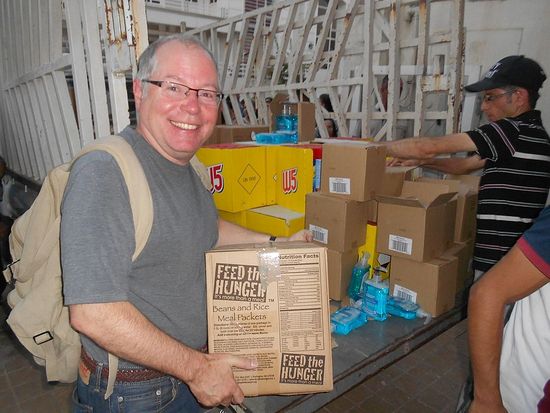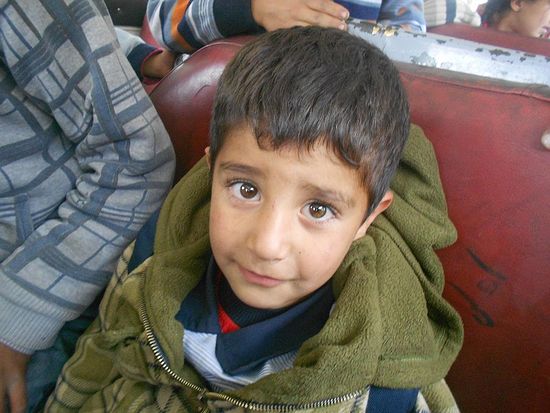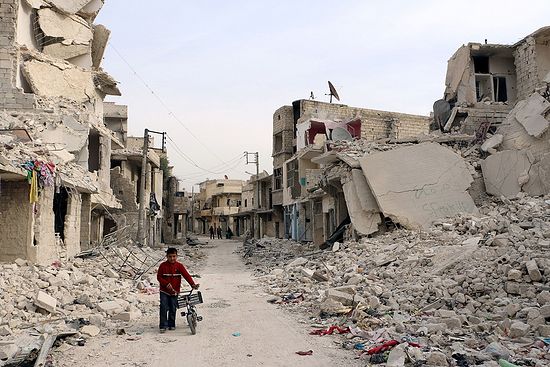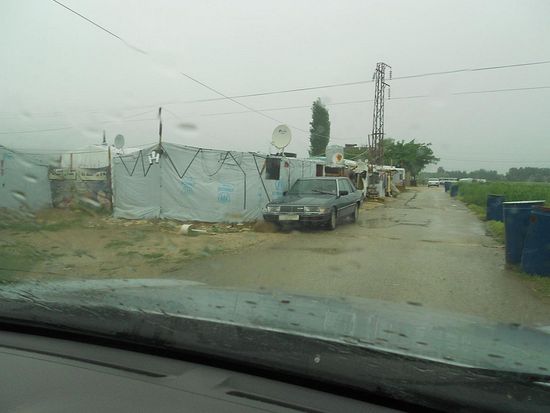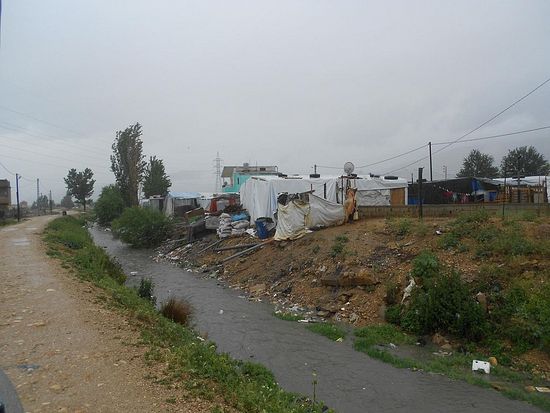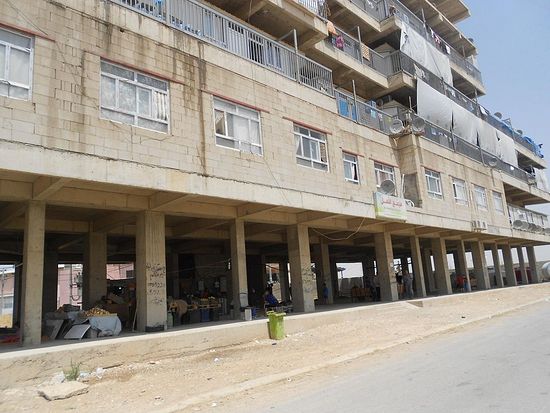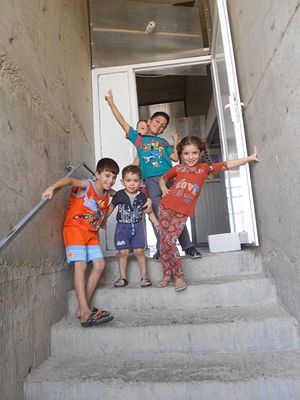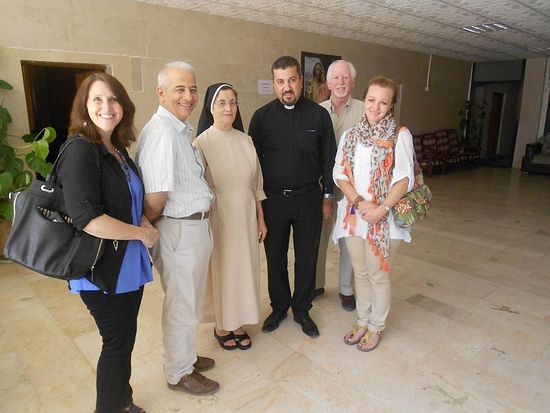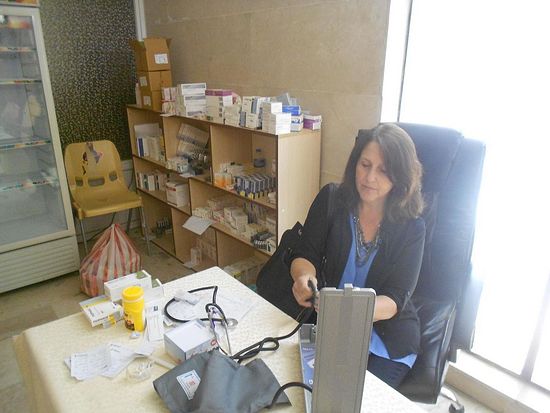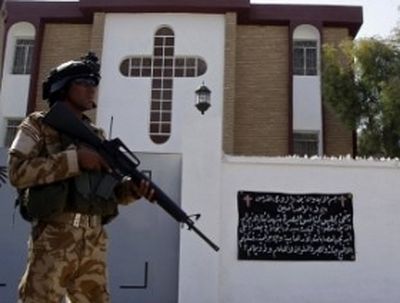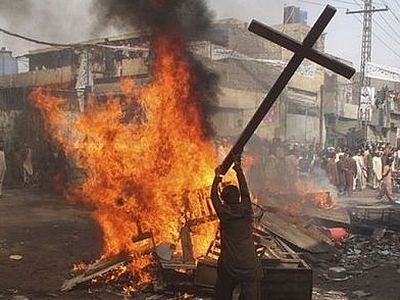This is the second part of an interview with Clifford Isaac Gardner, Senior Administrative Manager of Research in the Division of Nephrology at the Massachusetts General Hospital and member of a number of refugee humanitarian relief missions in the Middle East. Here we talk about his trips.
—Isaac, you have participated in a number of refugee relief missions. We are people on this Earth, also refugees—for here we do not have an enduring city, but we are looking for the life that is to come. Please, tell us about your work with refugees?
—You make a good point that we are sojourners and refugees. We are all related spiritually to Abraham and he was sojourner. He was born in Ur of Chaldees and fled to Haran. He kept moving his family to Palestine and then to Egypt because of the famine and finally back to Palestine. I have visited his grave at least ten times in Hebron, known in Arabic as Al-Khalil, because he was “the friend of God.”
My first interaction with refugees was in Pakistan. When we lived in Pakistan from 1986 to 1988, where I taught English, there were over three million Afghan refugees in Pakistan. We lived in Islamabad and I was on the board of a small school called Al-Hayat that taught English to Afghan refugees. Many of these refugees became Protestant Christians. That was where I first visited refugee camps. I was amazed at the tenacity and brave hearts of the refugees as they fled the war in Afghanistan. The Soviets had invaded Afghanistan earlier with the goals of obtaining a warm water seaport. They were heading right into the Baluchistan, a southwest province of Pakistan. It is interesting because my first students in Pakistan were Makrani Baluch. With all of these refugees our church had to show them great compassion.
My next significant time with refugees started in 1993. We lived seven years in Egypt, but the last three years I directed a semester study-abroad program in Cairo. I would take my American Christian college students to Israel and Palestine, including the West Bank, Gaza Strip and the Golan Heights. I’ve been in every corner of Israel/Palestine. I would take my twenty students and we would meet with Israeli and Palestinians all levels, from settlements to refugee camps to the Knesset. We were friends with Yasser Arafat’s brother Fathi. He was President of the Palestinian Red Crescent Society. I have visited nearly every Palestinian refugee camp in Palestine and West Bank/Gaza. Most of them have become small cities since their inception in 1948, from tented camps to brick cities. These camps are run by a unique UN agency called United Nations Relief and Work Agency and it’s only for Palestinian refugees. The UN’s main refugee organization is UNHCR for the refugees of the rest of the world. My students and I felt deep compassion for these refugees as we interacted with them. Most people who visit the Holy Land never encounter these refugees. They feel forgotten.
Our family left Egypt in 2006 and we moved to Boston where I worked as an administrator at Harvard University for many years. I would meet some refugees but did not have many interactions with them. Most of people I met were students, who were coming to the U.S. for higher education. It was about two or three years ago that I reconnected with an old friend of mine, Dr. Jim Jennings. He had been a professor at Wheaton College, the top Evangelical Protestant college located near Chicago, Illinois. Dr. Jennings was the person who had the idea to set up three study-abroad programs for Protestant Christian college students. He realized that his students knew very little about the Middle East and/or Islam. He dreamed of setting up three programs based in Egypt, Iran and Turkey. The students could study Arabic, Farsi or Turkish and learn about these countries and the role they have played in history and contemporary international relations. I was selected to be the founding director of the program based in Cairo, Egypt. It was called the Middle East Studies Program, and just celebrated its twenty-second anniversary.
I reconnected with Dr. Jennings at a reception I was hosting for Harvard at the Middle East Studies Association conference. I found out that he had started a humanitarian aid NGO called Conscience International twenty years ago. It is based out of Atlanta, Georgia. Where Dr. Jennings lives. Most of his supporters come from Protestant Christian backgrounds, but they also have diverse donors around the globe. Conscience International has three goals—the first is humanitarian aid relief, the second is peacemaking, (which is called U.S. Academics for Peace) and the third is women’s empowerment programs. CI is a very small organization but has been involved in international disasters and aid all over the world. No matter where in the world a disaster is—Africa or Middle East, Central Asia, Asia, or Haiti—Conscience International is there. They provide, tents, food, water, and clothing—helping refugees after and during earthquakes, famines and wars. Dr. Jennings has been doing this for twenty years. He’s been at multiple earthquake sites in Iran, the tsunami in Banda Aceh, the earthquake and floods in Pakistan, earthquakes in Yerevan, Armenia, and in Turkey.
Dr. Jennings asked me to become a part of this organization. I have been involved with U.S. Academics for Peace for five years now. I’ve been helping make arrangements as we go, and we take academics into complex peacemaking situations. This is mostly a secular group, with some Christians, some Jews and some atheists. We take American professors to Damascus, Khartoum and Tehran to interact with academics and thought leaders. Because our country is in conflict with these countries it is even more important for us to engage these parties. The motto of U.S. Academics for Peace is, “Dialogue is essential, or else conflict is inevitable.” In January 2013, I was able to go with a ten-person delegation to the Iranian cities of Tehran and Qom. We met over the ten day trip with many academics, thought leaders and clerics. We went as private American citizens interested in peace and dialogue. Two years ago, I was able to meet with the Iranian leader, President Ahmadinejad for a private meeting with our delegation. This Sunday I will be meeting the current Iranian leaders, President Rouhani and Foreign Minister Zarif at a private reception at the U.N. We are very intent on peacemaking between our countries, academic to academic. What helps is that Conscience International does not just talk about peace; we are very involved in humanitarian aid work. Two years ago, when we met with the Iranian Ambassador to the U.N., Dr. Mohammad Khazaee, he asked us to come for tea to meet Foreign Minister Zarif. We were going to be in Syria delivering medical aid to refugees. He was surprised by this and we discussed the important balance between the work we do with U.S. Academics for Peace and humanitarian aid.
I currently work as a hospital administrator at the Massachusetts General Hospital in Boston. For the past two and a half years I’ve been the volunteer Middle East Program Director for the Middle East and Pakistan for Conscience International. In September 2013, Dr. Jennings and I traveled to Eastern Turkey and Northern Syria to assess the needs of refugees fleeing the war in Syria. We were based out of the city of Gaziantep, Turkey. We worked with local partners and brought medicine. We traveled to the border town of Kilis, Turkey. We crossed into Syria to Bab-al-Salam and met with camp directors, doctors and medical staff. We knew that ISIS informants were nearby. Most people in America had not heard of ISIS yet. ISIS in English stands for the Islamic State of Iraq and Shams (greater Syria). In Arabic they are called DAESH (ad-Dawlah al-Islāmiyah fī 'l-ʿIrāq wa-sh-Shām), which means the Islamic State of Iraq and Greater Syria, and now it goes by the name, the Islamic State. When we left Kilis we were heading through Bab as-Salam to take important medicine (high end antibiotics) to a hospital in Haleb/Aleppo, Syria. We were informed that ISIS had already targeted our group for kidnapping about two or three kilometers away. Dr. Jennings is indomitable and wanted to continue, but we found out that even though the Free Syrian Army controlled most of the checkpoints, some were controlled by ISIS. At this point, ISIS was not killing people but just kidnapping journalists and humanitarian aid workers. They would use them as collateral for trucks of fuel, food or guns.
— Were you already Orthodox when this happened?
—At this point I was a catechumen, not yet baptized or chrismated, but my Orthodox faith was very strong in my heart. Our team decided not to go to Haleb and we turned back. We began walking across “no man’s land” the road between Syria and Turkey, lined with barbed wire fences and warning signs in English, Turkish & Arabic of landmines. I noticed a brand new Mercedes Benz driving towards us. It stopped across from us and out came this six foot five tall Pakistani Taliban. He was wearing a Pakistani shalwar kameez made out of camouflage material! We made eye contact and he glared at me. I’m sure that he knew I was a Westerner. He went to the back of his car and opened the trunk. I was sure that he was reaching for a Kalashnikov, but instead it was just a bag. Our guide, a journalist from New Zealand, loudly whispered, “Keep walking, make no eye contact.”
We then returned back to Gaziantep in Turkey. It used to have a very large Armenian Christian population. Now there is only one active church. It is a city of over one million with just one Protestant church! I was in the old bazaar one day and saw a shop full of old Armenian metal work, with crosses and fish on them. I asked the storekeeper, “Where are these objects from?” He said that they were sold here, “when the Christians left”. What a sad to know that the Christians had to flee this area of Turkey so many years ago—but God is still working in this region.
It was definitely my faith that gave me a passion for refugees. When we first went to this border crossing camp at Bab al-Salam, we encountered such desperate people. In the desert and there were over seventeen thousand people living in tents. There were around fifteen people in one tent. These tents did not have floors, just dirt below. There was no running water or toilets, just the desert. Seventy percent of these refugees were women and children. The men were fighting for the Free Syrian Army or they had been killed or they had already fled the country. Once a day the water truck would come and most people just used their hands as they didn’t even have cups. I so wished that I had brought cups. I brought zip lock bags so I give them a lot of them and I gave baby kits and blankets to the mothers. Once a day the soup truck would come (don’t worry it’s never hot soup) and they use their hands as well. There is so much poverty. We met with the medical staff in the clinic to learn more of the needs. They had little medicine or equipment. You probably have more medicine in your bathroom closet than the whole clinic had. They told us that in extreme emergencies they could take the refugees across the border to the hospital in Kilis. This whole living situation was so hard to see. I had never seen anything like this—ever! It was too shocking.
Our team found out that two days after we left the Free Syrian Army that was controlling the camp, the border was attached by ISIS. ISIS wanted control of the border. Whoever controls border controls the money and flow of goods in an out of Syria. Everyone who passes through this border requires bribes. All the trucks coming from Turkey give them money to get into Syria. Our team was learning the dynamics of the refugee situation. Most of these refugees were illiterate, from farms. We continued to work with our partners there. In Gaziantep we visited SEV Amerikan Hastanesi, a former Protestant Christian mission hospital, but now privately owned and secular. We wanted to see if we could partner with them to train Syrian doctors. We realized at this point that you can’t see Westerners in Northern Syria, because they would be kidnapped by ISIS or be detained by the Free Syrian Army. We gave our medicine to a different organization. So you learn to go very wisely. We only work with the local partners, who speak Turkish or Arabic. We work with many Syrian doctors with the International Medical Corps. You learn how brave the people are in fighting with ISIS. Syria has lost half of the doctors, seventy percent of the nurses and ninety percent of the administrators. It is an immense humanitarian aid crisis of epic proportions.
—Please tell us more about your work in Syria.
—One important role when working with refugees is to listen to them. They each need to be heard. We listened to many difficult stories of the people in the city of Haleb/Aleppo. One of my friends worked in a hospital in Haleb/Aleppo. It had been a hospital with five floors, but due to bombing they were only operating out of the basement. One story we heard was this: The city was divided between the Bashar al-Assad government, the Free Syrian Army and ISIS. They were all fighting with each other to control parts of the city. We hear about the families who were divided, one brother on one side and another brother on the other side. On one story of the hospital there was an open section through which people could go back and forth. They would bring medicine, food or money for relatives. The snipers from each side would sit on roofs and shoot at people. They would shoot young men going back and forth, thinking that they were defecting or spying. So the people stared to send younger children for these errands. My friend was there when a seven year old boy and his little sister were bringing medicine to their sick grandmother and he got shot in the head. The Free Syrian Army captured the government sniper and interviewed him. They had many questions, and asked him why he had killed this boy. He responded, “I was just sitting there with my friends and one of them bet me a pack of cigarettes if I could shoot the boy in the temple of his head.” This is how tragic it is; I mean life has become cheap and worthless. Everything becomes a commodity and can be sold for a price. While in Bab al-Salam I encountered a young boy walking with a gun. I scolded him and gave it to a nearby adult. In camps they often use children to sell drugs or guns. Mothers often stay in the tents while their small children wander around the camp. It is not a safe place for them.
Turkey has allowed over two million refugees into their country. As an organization, Conscience International wanted to focus on this crisis in the Middle East and continue to work in Iraq, Turkey, Lebanon and Jordan. This refugee crisis will do nothing but increase in magnitude and tragedy.
—I know that you have taken a number of trips to the Middle East. Where else have you gone?
—The next trip I was able to go on was to Lebanon. In May 2014 I went to Beirut. I speak passable Arabic. Conscience International partners with a few groups that work with refugees in Lebanon. It is interesting to see what is happening in Lebanon. Lebanon is one half the size of the state of New Jersey. It is a very small area, but it has a population of over 4.5 million Lebanese, and now there are over a million Syrian refugees in every corner of Lebanon. Lebanon has 17 legal religious denominations, they have: Sunnis, Shias, Druze, Orthodox, Catholic, Baptist, Presbyterian and others. Lebanon is divided by religious affiliation. The president is always a Christian Maronite, the prime minister is always a Sunni Muslim, and the Speaker of the Parliament is always Shia. I believe that the Druze also hold a key position. This is how these groups share political power. Like many churches in the Middle East, there is very little interaction or cooperation between the Protestants, Orthodox and Catholics. They are religious minorities so they protect their own turfs. This is a very common occurrence that I experienced in Egypt as well. One historical trait is that when Protestant and Catholic missionaries came to the Middle East to evangelize Muslims, they faced great opposition and they so turned their efforts to nominal Orthodox. Many Orthodox feel the bitter effects of this type of “sheep stealing.”
But what is happening with refugees in Lebanon is that the Orthodox, Catholic and Protestants are working together. They are all joining together to serve refugees. In Lebanon there are no “official” refugees as the government does not recognize them. There are no official refugee camps. Some places are referred to as “transition centers”. The Lebanese churches are actively involved with refugees in food distribution, finding housing, providing medical care and education for children. The group we serve with visit refugee families every week, building relationships and assessing their needs. Conscience International is pleased to work with these various groups in providing funds to support these ministries. We are a small organization but get to the heart of the refugee crisis. When you donate a dollar, it primarily goes into the hands of those helping the refugees. We are very respected by the donors in America, which are mostly churches or concerned individuals.
During my trip there I went up to the Bekaa Valley, where we work with a Bedouin chief. He runs a school for Syrian refugee children and is involved in food distribution. We also bought a bunch of mattresses for beds, and some stoves. Most of these Syrian refugees are living in fields in tents where they pay annual rent. The tents are provided by UNHCR. Other refugees live in empty buildings, where they have set up temporary walls. Others are living in smaller buildings. You know that four years ago the “Arab Spring” began. When the fighting began in Syria the wealthy fled first to the West, the middle class moved to Lebanon, Jordan or Turkey and the poorest are the ones living in border camps. It is estimated that one half of the Syrian population has been displaced due to this unnecessary civil war.
The Bekaa Valley is a porous border between Syria and Lebanon and the easiest for refugees to cross. There is a current humanitarian crisis in this valley with many needs. I was in the city of Saadnayel where my friend is also the bus driver for the local public school. He invited me to join him for his route. As we were driving slowly up a hill towards the school we passed two hijabed (veiled) women walking. We invited them aboard and found out that they were Palestinian refugees. I asked them where they were from and one woman said without hesitation, “Safed”. Now Safed is an old city in Israel where Jews and Palestinians lived for many generations. Her grandfather left in 1948 and fled to Jordan where they lived in a refugee camp. The family eventually moved to the Palestinian refugee camp in Syria called Camp Yarmouk. It had grown to over one hundred thousand people before the Syrian civil war. Now less than fifteen thousand people live there. Now she has fled to Lebanon. There is no rest for the refugee. Lebanon has many refugees from Palestine and they don’t want anymore. This could be one reason why Lebanon doesn’t want to establish anymore refugee camps. We trust that our workers in Lebanon will continue to work with our partners there on the ground.
The next trip I was able to take was to Iraq. In February 2015, I went with Dr. Jennings to the northern province of Iraq, called KRG – Kurdish Regional Government. It’s very different from the rest of Iraq as it’s controlled not by the Iraqi army, but by the Kurdish “Peshmerga”. They are the Kurdish defenders. Peshmerga is made up of two Kurdish words, “pesh” means face and “merga” means death. Those who face death! They are very brave fighters that include men and women. Now there are Kurds in Iraq, Iraq, Syria and Turkey. The Peshmerga protect the various parts of KRG whose capital is Erbil (Arabic name) or Hawler (Kurdish name). We stayed in a small Christian enclave of Erbil called Ainkawa. It was in Ainkawa where the Apostle St. Thomas came through on his way to India. He was known to have started the first century church in Ainkawa. Ainkawa is now home to many Syriac Orthodox, Chaldean Catholic and Protestant churches. Most of the Christians there speak Syriac, a modern version of Aramaic, which Jesus spoke.
We all know what happened in the summer of 2014. ISIS invaded Northern Iraq and took the cities of Mosul, Qaraqosh and the Sinjar Mountain area. The Iraqi army fled to the south and at least two million people fled into the KRG. Some went north to Turkey but most fled to nearby KRG. And they went to people that were like them, so those that fled Mosul were Sunni, Shia, Druze, Yazidi Kurds, Orthodox, Catholics and Protestants. They all fled. The Yazidis went to their Yazidi relatives and the Chaldeans went to Chaldeans. Mosul was the second largest city in Iraq. Most of their population fled to nearby Erbil. We came with Conscience International to help our partners in their refugee outreach. We brought money to help buy medicine which is available in Iraq. We met so many amazing Christians in Ainkawa. We met one Protestant Christian pastor, who was from Mosul. He heard that ISIS was coming towards his home the night they were having a prayer meeting at his home. It was very unique that they were all gathered in the East side of Mosul and with so eight cars. They loaded up the cars and drove to Erbil, some fifty kilometers away. He found out from his neighbor that ISIS had not reached his home so he went back to get more things from his home. He ended up sending a truck to pick up more of his belongings. The truck driver was captured by a commander of ISIS and he called the pastor on his cell phone. “Akhuya, brother, someone is stealing from your house.” The pastor explained that he had hired this driver to pick up his belongings. The commander asked, “Why did you leave Mosul? Why have you left? You are like a crown on my head.” The pastor laughed as he told me this story. “Yes, but I didn’t want a martyr’s crown just yet.”
The refugees fled ISIS controlled areas and fled to Erbil. Many of them live in churches. They first came and camped out inside and outside of the churches. I saw people sleeping on the pews, living on the grass. And they are still there to this day. Some of them have moved to other places. When we went there, we visited different camps in Erbil, run by mostly churches, but supported by the Kurdish government. These people are not considered refugees but rather IDPs, internally displaced persons. We visited seven camps around KRG. We first went to a camp of twenty thousand Syrian Kurdish refugees who have been there for two years. As refugees they are not able to officially work in Iraq. One day we took a trip towards Mosul and were about seventeen kilometers away. We took the north road with all of the Turkish trucks and headed to Dohuk. We visited two Yezidi Kurdish camps. We were about two kilometers from Ninevah. Reports claim that much of ancient Ninevah has been destroyed by ISIS.
At the Yezidi Kurdish camps we met with many refugees, and we handed out some baby kits. The camp director also said that it was very hard for Christian groups to officially work in these camps but welcomed our team. We returned to Erbil where we visited the camps that Orthodox, Chaldean Catholic, and Protestant churches had started. One camp was located in a shopping mall that was in the process of being built. But it was an empty concrete shell when the IDPs from Mosul arrived. Just picture concrete, stairs, no elevators and they live in tents on each floor. These people had been there six or seven months. They were hopeful that we might come back and support the mobile medical unit. There is also another location called Amal (Hope) Camp. It is a seven story concrete building in the desert. Three hundred people live there with only three bathrooms and three kitchens. We helped buy medicine for the medical team.
During my time there I realized that faith is so important. For these people it was their Christian faith that was keeping their spirits hopeful and alive. We interacted with Muslims Kurds, Yazidis, Orthodox, Catholic and Protestant Christians. When you are a refugee it doesn’t matter, it affects everyone. We had heard that in Turkey they were separating refugees by religious groupings. This is very common – people want to go to people who are like minded. It is amazing to see the faith of these people, who have lost everything, homes and businesses. What is sad is that when ISIS invaded Mosul it was the first time in seventeen hundred years that a mass or liturgy was not served. Even under the Ottomans and Saddam Hussein this had never happened.
Something interesting that I found about Christians in Iraq is that they don’t want to leave their country. They want to stay in Iraq. They want to go back to Mosul or Qaraqosh. What a deep, deep faith. When you lose everything, what do you delight in, what undergirds you?
—I know that your wife joined you recently in your trips. Please tell about this?
—As we have been going back and forth to the Middle East, our parish at Holy Resurrection Orthodox Church has been very involved. Many Orthodox friends knew about our trip and have provided refugee kits. This past August my wife, a public health nurse, went with our team to Iraq. There were four of us: Dr. Jennings of Conscience International, my wife and I, and a woman, who works in Indonesia in prisons. Her specialty is art therapy. We went to Iraq for about a week to do medical work, art therapy for teenagers and food distribution. It was an amazing time. My wife was able to be involved in a mobile health clinic. She met with patients and encouraged the doctors. She went with them to buy much-needed medicine from distributors in Erbil.
It’s interesting to see Iraq after their war and to observe how the sanctions effected the economy and health of the average Iraqi citizen. It really devastated the economy. If you go into a store in Erbil you will find almost nothing produced in Iraq. It is all imported. I met a Syrian refugee running a vegetable and fruit market. There was a strange fruit there. I asked him, “What is this?” It turned out to be an avocado from Tanzania. He said that none of his products were grown in Iraq. I couldn’t believe it! What’s interesting is that medicine is readily available in Iraq. Instead of bringing medicine, we just bought medicine for these clinics. You realize when you work with refugees that the first thing you focus on is shelter, then clothing, food and then livelihood: education, trying to find job. There are some Syrian children who had not been in school for three years. So there is very big need for schools. People are very restless.
It is interesting to find in Iraq that most of the family units were intact. When I was in Beirut I met this Armenian woman. Her husband was still in Haleb/Aleppo, her eldest daughter was in Yerevan, Armenia, her son was in Austria and her youngest daughter was in Sweden. Five people, five different cities, five different countries. How very sad. You realize that families have just been splintered. Now in Syria, the Christians are leaving and they will probably never go back. In Iraq most of them are not leaving; some migrated during the war, because during the war a lot of Iraqis left. Some went to Jordan, especially the Chaldean Catholics. This is because the Christians in the Middle East have contact with people in Western Europe and America. The Christians have Christian connections but the Muslim have very few connections or friends in the West.
It is also interesting to watch the “brain drain” of Christians in the Middle East. But whenever you go online you see that the Christians in Iraq are still there. They are very strong and their faith is very strong. It was interesting in the last trip—we met a priest who told us the story of the last man to leave Qaraqosh, a priest. His church was very historic and had ancient manuscripts. He had been digitizing them for years. He was supposedly the last car to leave Qaraqosh, full of rare icons and manuscripts. After he left Qaraqosh a day later he got a call on his cell phone. It was a commander with ISIS. He said to him, “Akuya, brother,” (they love this brother thing) I am in your church; there is no electricity, so where we would use a generator? How do you use the generator?” So the priest kindly gave him instructions on how to use the generator and the lights came on. The priest added, “Please take care of my church,” and they said “We will not destroy your church!” Supposedly many of the churches in Qaraqosh have not be destroyed because of this.
We heard another story from a Chaldean Catholic priest (who was married, by the way, with the blessing of his bishop!) when we went down to the city of Sulemania. His parish has around one hundred families and over two hundred families fled Mosul when ISIS attacked and came to his city. His parish was able to house, feed and take care of medical needs of these families. By the time we got there most of them had migrated to other parts of Iraq. While there we met this middle-aged Chaldean Catholic nun. She had started a pre-school in Qaraqosh. When ISIS was advancing on Qaraqosh she was told by the Peshmerga that they had time to pack and leave the city. But the next day a friend called her and told her to leave her apartment immediately as ISIS was coming. She fled into the street with two heavy suitcases full of personal effects along with photos, documents and icons. She arrived just ahead of the last bus to leave the city. It was full of elderly and handicapped people. She asked where she could put her luggage. The driver just pointed to the crowded bus and said if we take your luggage we will be unable to take one or two of these people. She set down her luggage on the ground, boarded the bus and fled to the KRG. What an amazing woman, whose faith had sustained her. She is now working with young mothers and children. We gave her some of our baby kits from our parish and she was so grateful. To encounter deep faith in the midst of trials is so convicting when I think of the things I worry and complain about in my daily life.
—You mentioned that your Boston parish, Holy Resurrection Church took part in gathering things for your trip?
—I think of ways that our parishes can become involved in helping refugees. Our parish has been gathering items and creating hygiene and baby kits. The hygiene kits consist of a zip lock bag filled with soaps, toothbrushes, toothpaste, washcloths and combs. The baby kits consist of a zip lock bag filled with baby blankets, cloth diapers, shampoo and creams. We gather together and create these packets. We then mail them to IOCC (International Orthodox Christian Charities) who distribute them to organizations working with refugees in the Middle East. When our parish found out that we were going to Iraq they wanted to have us bring these kits. They were told to bring them into our sanctuary. We were overwhelmed with the generosity and compassion as they brought bag after bag of kits. Our priest, Fr. Patrick, prayed over and blessed with holy water these packets. We ended up fitting them into four large suitcases. In Iraq we were able to personally hand them out to refugees and IDPs. We gave some of the baby kits to the young mothers who were pregnant. It was so amazing that our parish could be involved in such a tangible way. We felt that they are with us when we went to Iraq.
I think the value of the Orthodox faith is that we can pray specific prayers that people’s hearts would be softened. My wife and I have learned to pray the Akathist to the Theotokos to soften people’s heart to God and others. I think what happens is that we sit in our countries watching the bad news coming out of the Middle East and we despair and have fear, which paralyzes us. When I was visiting the Yezidi IDP camp in Iraq, I asked camp director, “How close is the border with ISIS to this camp?”, he said that it was two to three kilometers away and asked if I was afraid. I told him, “no”. He said, “Good, we don’t need any more fear here.” So the people who live closest to the real and imminent danger have less fear that those of us on our couches watching the news. One goal of ISIS is to create terror and produce fear. The Bible tells us, For God hath not given us the spirit of fear; but of power, and of love, and of a sound mind. You know these people live under the shadow of ISIS and in a moment are unable to flee. So it’s important as Christians to continue to pray for them, the refugees of the Middle East, and now those in Europe. We should continue to support them financially, because these churches need every dollar to be able to help so many people. They feed them, give them medicine, give them schools, give them teachers, encourage them and give them hope.
I have met a few of these refugees who have left the Islamic faith and become Christians —mostly Protestant, but I am sure each of them will encounter Orthodox and Catholics.
Don’t be afraid of those soldiers of ISIS but pray for them, because we know that they have souls, and you know Saul, before he became St. Paul was an enemy of the church and actively persecuted it. One of the groups we work with in Iraq has a Christian radio station that broadcasts across Iraq and Syria. They have a phone number interested listeners can call to learn more about Jesus, the Bible and Christianity. Well one day they received a blocked call from a man in Syria. He asked that they not hang up on him. He was a soldier with ISIS and had heard their radio broadcast and wanted to become a Christian. They were able to connect him with Christians in Syria who helped him escape. There are many such stories in the midst of the chaos and destruction. We can pray for these people, the persecuted and the persecutors. We pray that they would see the falseness of their faith beliefs and misconceptions. As Christians we believe that every other world religion that is not following Jesus Christ is a counterfeit. When you have a twenty-dollar bill, you know that no one makes counterfeits of three-dollar bills because we don’t have those bills, but they’ll make a counterfeit of twenty dollar bill because it looks similar. And we know that even in Islam, if you read the Quran, there is a passage that speak highly of Jesus and Mary. The only woman’s name mentioned in the whole Quran is Mary, and the “Prophet Jesus” is a prophet very honored in the Quran. There are definite elements in the Quran that can lead people to Jesus and Mary, the Theotokos. There is only one way to God, but many ways to Jesus. So it’s very important that you come to Jesus and you understand that. It’s interesting that many Muslims are encountering compassion with Christians in their refugee crises. We are told to show compassion to the widow, the orphaned and the imprisoned. The goal is to show compassion to these refugees, not to convert them. I know some people say, some donors ask us, “Why do you want to give to refugees? Are you trying to convert them?” No one can convert the heart— only the Holy Spirit can do that!
As we were preparing for our last trip to Iraq we heard about St. John the Merciful of Egypt. His prayer goes like this, “Help me help God’s helpless.” We prayed this prayer a lot when we served in Iraq. In our work with displaced peoples and refugees we also pray to St. John Maximovitch of Shanghai and San Francisco. He was very compassionate towards orphans and also refugees. Our Orthodox faith motivates my wife and me to serve refugees. We are able to share that we are Orthodox, and it has provided a great opening to many people to share our own stories about how we became Orthodox; how we believe that God uses all things in our lives to bring us into right relationship with the Holy Trinity. He even allows wars and crises to create a space of compassion to grow in our hearts and minds.
